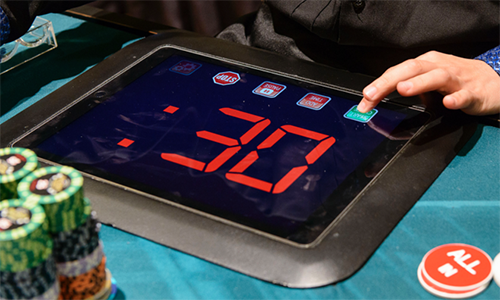WPT to Use Action Clock in Tournament of Champions
One of the problems people have with live tournament poker – even those who love the game like it was their own child – is that it can be excruciatingly boring (I suppose that applied to cash games, as well). As fun as poker can be, it can be just awful sitting through hand after hand, folding cards left and right, only occasionally seeing anything exciting. What can make things worse is when players routinely tank, thinking for a long time about what to do in every hand. There is certainly nothing wrong with thinking carefully, but there are plenty of players who decide that even holding 2-7 offsuit facing a pre-flop raise is a hand worthy of deep pondering. For a number of years now, there has been growing support for the implementation of some sort of “shot clock,” similar to what exists in online poker, in order to limit the time players have to make their moves. For next week’s World Poker Tour (WPT) Tournament of Champions, that exact concept will finally come to life in the form of the “Action Clock.”
Tournament Director Matt Savage announced the arrival of the Action Clock earlier this week via Twitter. The way it works is quite simple; anyone who has played internet poker will be used to this already. Each player gets 30 seconds to act. The Action Clock will be controlled by the dealer and started when the last card is dealt. Thus, pre-flop, all the players will receive their hole cards and the dealer will then start the Action Clock. Similarly, on the flop, after the flop is dealt, the clock will begin for the first player.
 If the player whose turn is up folds, the clock will be reset and the next player will have 30 seconds to make a decision. If there is a bet to open the action or a raise, the dealer will first count out the chips, announce the bet, and then start the clock. On a straight call, the clock will start immediately for the next player since the dealer doesn’t need to count any chips.
If the player whose turn is up folds, the clock will be reset and the next player will have 30 seconds to make a decision. If there is a bet to open the action or a raise, the dealer will first count out the chips, announce the bet, and then start the clock. On a straight call, the clock will start immediately for the next player since the dealer doesn’t need to count any chips.
The dealer will give players a 10-second warning. If a player fails to act in time when facing a bet, his hand will be killed. If he is not facing a bet – that is, if the action has checked around – that player’s hand will be checked. If the player declares an action just as time runs out, it will be a sort of “tie goes to the runner” situation and the player will be allowed to complete the action.
There are no “time outs” or pauses of the clock unless deemed absolutely necessary. One would imagine something like a disputed ruling would apply in this instance.
Also like in online poker, players will have the opportunity to dip into a time bank. Each player in the WPT Tournament of Champions will be given four “extension” chips each day. These chips can be played at any time to give the player an extra 30 seconds to act. More than one can also be played at once, giving the player up to two minutes extra, depending on how many are used. Extension chips do not roll over to the next day, so the most chips anyone can have is four. They are non-transferrable and have no cash value, so nobody is going to be selling them or giving them to their buddies for a final table run.
So far, it looks like the poker community is in favor of this experiment. Again, everyone understands if someone needs to consider an important move at a key point in the tournament; nobody begrudges anyone the opportunity to think. The problem comes in when players decide to Hollywood it up or mimic Chris “Jesus” Ferguson and tank on routine plays.
One of the most extreme examples of unnecessary tanking took place during the 2005 World Series of Poker Main Event. Tiffany Williamson, a lawyer from South Carolina, had a fantastic tournament, finishing 15th and winning $400,000. She frustrated the hell out of her fellow players, though, as she took ages to consider every action. One of the instances highlighted on the ESPN broadcast came late in the tournament when controversial trash talker Shawn Sheikhan had pocket Aces and raised pre-flop. Williamson re-raised with K-J suited and Sheikhan moved all-in, putting Williamson to a decision for the rest of her chips. To most people watching, including the commentators, it looked like an easy fold. You don’t go to the mattresses with K-J when facing an all-in raise like that. But Williamson tanked. And tanked. And tanked and tanked and tanked. She went to the rail at one point, looking like she was going to make a phone call, but Sheikhan quickly called her out on that. It was amazing. The other players got quite restless; one even commented that two players had been eliminated at other tables while this hand was being played out. Finally, someone called clock on her and she ran out of time, so her hand was folded.
And that wasn’t the only time Williamson tested her tablemates’ patience.
That was an extreme example, but nevertheless, many in the poker community have gotten sick of chronic tankers, so the WPT trying something new with the Action Clock is a welcome sight.



















COMMENTS